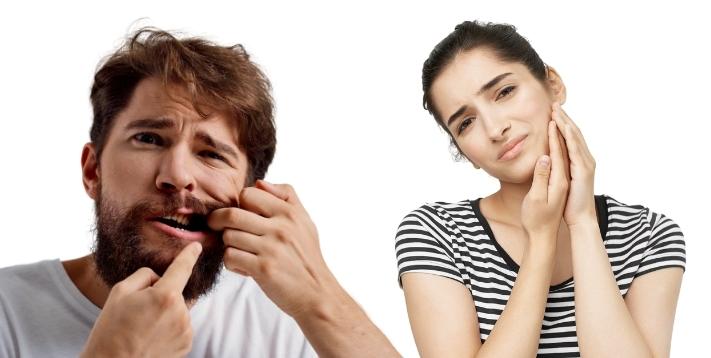TMJ AND MOUTH DISORDERS
Temporomandibular Joint connects the upper and lower jaw near the ear. The joint is padded with cushioning and often wear, and tear of this cushioning can lead to TMJ related issues, one of them being mouth disorders.
Pain caused by a TMJ often originates in and around the jaw and could then spread through the face, neck, and shoulders. Headaches, earaches, and pain behind the eyes are a result of the muscles connected to the temporomandibular joint. When the muscles tense up and malfunction, they lead to severe pain in the area. Bruxism or teeth grinding is another symptom of TMJ.
Symptoms Of TMJ
- Pain or tenderness of your jaw
- Pain in the jaw point
- Clicking and popping sounds in the jaw joint
- Disturbance in jaw alignment that causes pain in head and neck
- Pain in one or both of the temporomandibular joints
- Aching pain in and around your ear
- Difficulty chewing or pain while chewing
- Aching facial pain
- Joint locking that makes one unable to open or close your mouth
- Orofacial pain
CAUSES
Painful TMJ is a result of
- Eroding disk that misaligns the jaw
- The cartilage around the joint is damaged by arthritis
- The joint is damaged or shifted by a blow or other impact
DIAGNOSIS
A TMJ specialized dentist is the one who can treat this disorder. The dentist might ask you to do a certain prognosis to gauge your situation before recommending a treatment.
- Dental X-rays of teeth and jaw
- CT scan of the bones in the joint
- MRI for understanding the problems with the joint’s disk or surrounding soft tissue
- TMJ arthroscopy is also a kind of diagnosis for TMJ disorder. During this process, the doctor inserts a small thin tube with a camera at its end into the joint space, to view the area and offer a diagnosis.
TREATMENT
TMJ disorders might reverse in some cases. But for recurrent issues, the TMJ specialist would recommend various treatment options depending on your condition.
Medications
- Pain relievers and anti-inflammatories
- Tricyclic antidepressants
- Muscle relaxants
Therapies
Oral splints or mouth guards
Physical therapy
Counselling
Surgical or other procedures
Surgeries
In case the therapies and medicines are unable to bring a change in your condition your dentist might suggest surgery.
Arthrocentesis
Under this minimally invasive process, the needles are inserted into the joint to remove debris and inflammatory by-products.
Injections
Injecting corticosteroid or botulinum toxin type A (Botox, others) into the jaw muscles for pain relief.
TMJ arthroscopy
In a similar process as arthroscopy diagnosis, minimal surgery is conducted which is less complicated and risky as compared to open surgery.
Modified Condylotomy
Modified condylotomy is conducted in case of extreme pain and if locking is experienced.
Open-joint surgery
If the joint is much displaced structurally and cannot be restored by conservative means or medicines, open-joint surgery might be recommended by your dentist.
Your TMJ specialist Dentist is your best guide to suggest which treatment is ideal for your situation.
We at Ivory Dental Clinic are TMJ specialists and help you in understanding and reversing your TMJ disorders. We are a well-known dental clinic in Seawoods that offers various dental expertise under one roof.
Get in touch with us to know more about your TMJ condition and to initiate early treatment.


